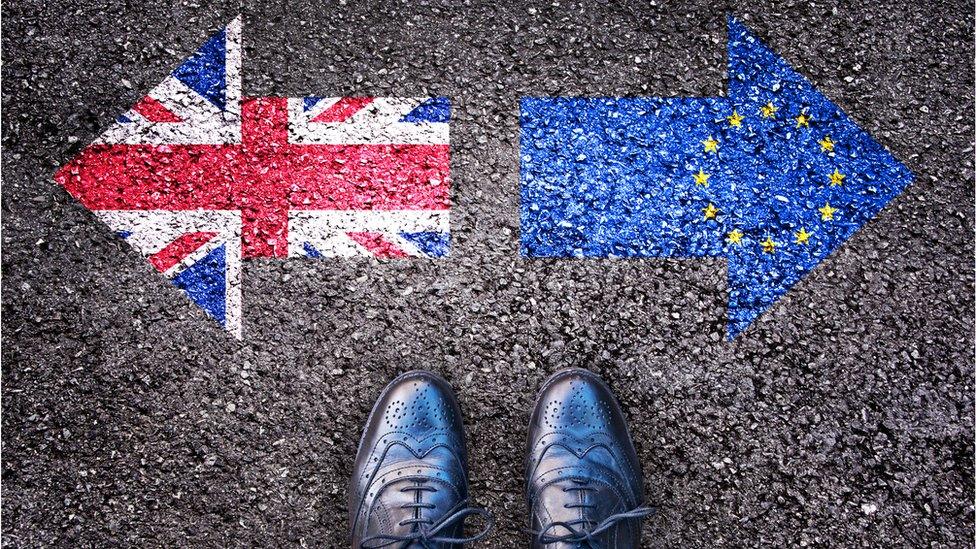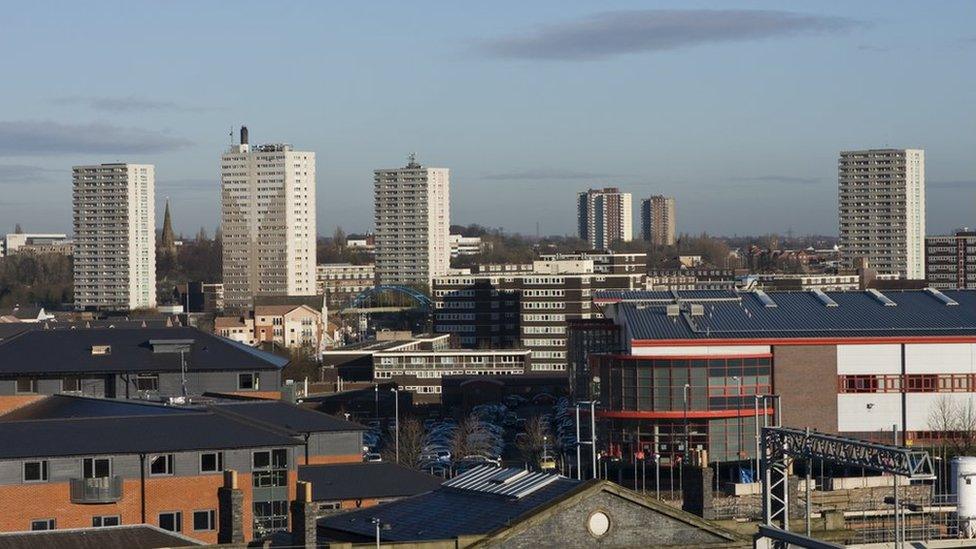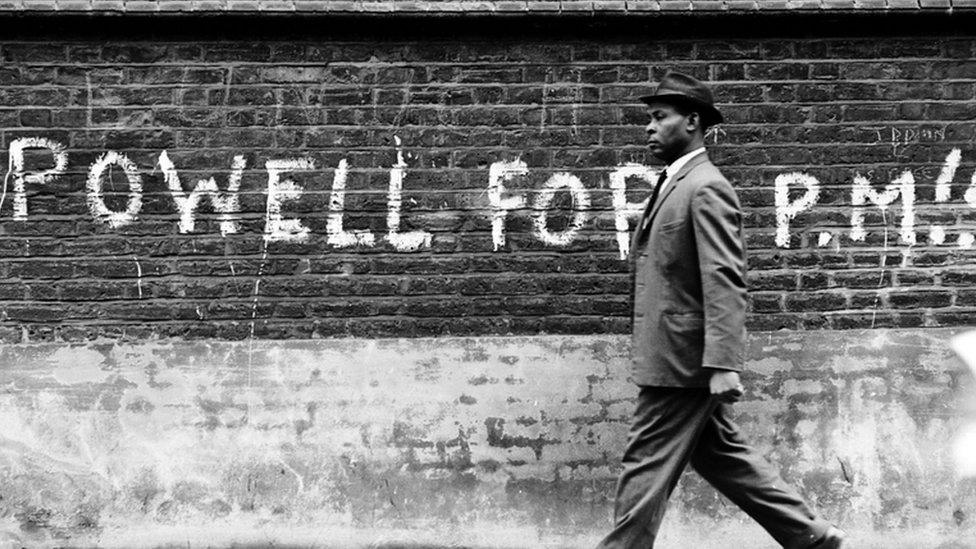Keeping on track towards polling day on 8 June
- Published

One of the most striking new features of our changing urban landscape has to be the glistening tram tracks snaking their way through our towns and cities.
And as regional devolution gathers pace like one of those shocking pink Midlands Metros, we know there will be plenty more, criss-crossing our West Midlands conurbation.
Principal tram stops are becoming familiar community meeting places.
So I am tracking opinions, trackside at Wolverhampton's St George's terminus.
I want to know how many people really do feel that this election is principally about Brexit and strong leadership; the reasons given by Theresa May for calling it in the first place.
Or is it more about public services and the anti-austerity agenda advocated by the Labour Leader Jeremy Corbyn?
None of what follows is remotely scientific of course.
But most people here at the tram stop give text book Theresa May answers: strong leadership into the Brexit negotiations; getting a grip of immigration; they seem still to trust the Conservatives on this despite their repeated failure to meet their stated target of reducing net migration to the tens of thousands.

I read the polls of course, so it shouldn't come as a surprise.
But this is a city which, with only rare exceptions, has been a predominantly Labour stronghold for the past quarter of a century.
One after another I meet "ordinary working people" who tell me "Theresa's doing a good job".
And they're not entirely sure what exactly Labour stand for any more.
There's precious little evidence of any so-called "Buyer's Remorse" among the people who voted Leave last June.
Our part of the country has long been more of a two-party affair than most other areas of the UK.
And there's little sign of any traction here at the tram stop for the Liberal Democrat Leader Tim Farron's anti-Brexit message, and I detected no enthusiasm for a second referendum in a city which voted by 63% to Leave the EU.
So far, most of the people I speak to happen to be white British.

So I decide to explore further afield in a city where black and minority ethnic groups account for over 30% of the population.
That number has doubled over the past 25 years.
In the process of such rapid growth, these groupings have inevitably become more complex and variegated.
Airy generalisations about an en-bloc vote, usually for Labour, seem more redundant than ever.
Lord Ashcroft's polls last year suggest that Labour's support in BME communities has fallen from an average of around 80% 20 years ago to something under 70%.
The polls also suggest a corresponding rise in Conservative support.
What now for "the BME vote"?
Closer examination of Wolverhampton's minority ethnic groupings reveals that people of mixed race account for 5.1% of the total population, just behind those of African Caribbean heritage who constitute 6.9%.
By far the biggest single ethnic grouping is the Asian community, which stands at 18.8% of Wolverhampton's total, according to Census returns.

A New Cross Hospital worker is impressed by what she sees as improving clinical outcomes for patients
So I head next to the Sikh temple, or Gurdwara, in Willenhall, on the outskirts of the city. Once again, these soundings are anecdotal. But they are fascinating nevertheless.
I am greeted there with peons of praise for the late-lamented Labour MP Ken Purchase, who had supported and encouraged them during his 18 years in Parliament until 2010.
I talk to a mother and her son who come from a family line of Labour voters and are determined to maintain the tradition.
More often, though, I hear the increasingly familiar mantra about leadership, Brexit and, yes, immigration.
I am even told by one woman who works at the city's New Cross Hospital that she will vote Conservative because most clinical outcomes for most patients have improved significantly over the past seven years.
I ask myself, what can be happening here?
Is Labour's vote fragmenting among our BME communities which have given the party such solid support for so long?
The Conservatives have long talked about making inroads into Asian communities: but with only limited success.

A whole day in Wolverhampton and no-one mentions Enoch Powell
Could it be that Brexit really is the game-changer here as well?
For a more complete reflection of opinions around the city, I head next towards Chapel Ash, home to a large African Caribbean community.
In the local hairdressers' an 18-year-old law student is bursting with excitement about voting in her first general election.
Labour definitely have her support, she tells me, and it's not just because they are promising to scrap tuition fees.
She believes they are more in touch with young people and she is especially keen to see the extra £6 billion they are pledging for the NHS: that's a promise subsequently matched by the Conservatives.
Again and again I hear from more and more people here who are more concerned about their public services than they are about Brexit.
And there is a widespread suspicion that Mrs May has called the snap election principally for the sake of party advantage rather than to "strengthen her hand" in the European negotiations.
In stark contrast to the comments I had heard about the NHS from the health worker in the Sikh temple, one black woman who has worked as a hospital nurse for nearly 20 years tells me it grieves her to see the service under so much pressure.

The UK's party leaders are trying to convince adults to vote for them at the general election
So what am I to make of all this?
My soundings seem to chime with those published recently by researchers at the Runnymede Trust.
They indicate that Labour continues to enjoy most support among black and Muslim groups - around two-thirds.
But they also suggest Labour is slightly less popular among Asians, especially Sikhs and Hindus.
Mixed race voters are reported to be around 50% Labour-supporting, 25% Conservative, with the remaining 25% shared between the other parties.
One final reflection
My day in Wolverhampton proves absolutely nothing of course.
But I will remember it not just for what was said, but also for what was not.
I happen to have spent the bulk of my time in the Wolverhampton South West constituency once made famous, notorious even, by a certain John Enoch Powell.
And yet no one I spoke to so much as mentioned his name. Perhaps, at long last, our politics really has finally moved on from all that.